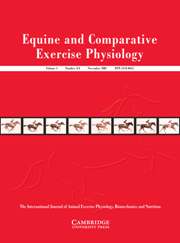No CrossRef data available.
Article contents
Effects of diet, feeding and daily variation on acid–base balance in horses
Published online by Cambridge University Press: 09 March 2007
Abstract
This paper reviews the acute and chronic effects of feeding, diet composition and daily variation on equine acid–base status. The dietary cation–anion difference (DCAD) has a marked effect on blood acid–base balance in both the short term and long term. In general, diets with a low DCAD generate an acute acidosis that develops into a persistent though mild systemic, strong ion acidosis with long-term feeding. In contrast, high-DCAD diets result in a mild, persistent strong ion alkalosis characterized by elevated plasma pH, [HCO3] and total CO2 (TCO2). The acute blood acid–base responses to feeding include alterations in plasma pH and plasma concentrations of HCO3, TCO2, Cl−, Na+, K+ and protein. The forage component of the diet appears to be primarily responsible for the acute responses. There is limited research examining abrupt alterations in DCAD and the influence of daily variation on equine plasma acid–base balance. It is concluded that the composition of the diet, duration of adaptation to the diet, timing of feeding and time of day need to be considered when examining acid–base balance in horses.
Keywords
Information
- Type
- Research Article
- Information
- Copyright
- Copyright © Cambridge University Press 2004

